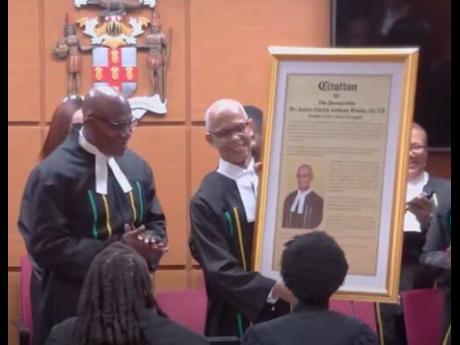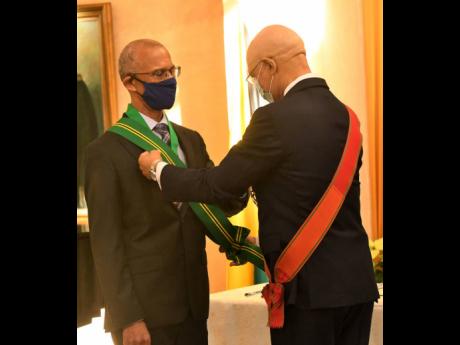Justice Brooks praised for transformative leadership
Outgoing Court of Appeal president leaves a legacy of excellence and reform, say colleague jurists
Justice Marva McDonald-Bishop, the incoming president of the Court of Appeal, has praised outgoing president Justice Patrick Brooks for his transformative leadership, which has filled her and her fellow court members with pride in having served alongside him.
McDonald-Bishop was speaking on Wednesday at a special sitting of the Court of Appeal, which marked the retirement of Brooks, who officially demitted office on his birthday.
Chairing the proceedings, McDonald-Bishop paused for a moment to offer well wishes to Brooks, who was appointed to the Court of Appeal on January 16, 2012, and ascended to the presidency on December 7, 2020.
Describing him as “a fine jurist”, McDonald-Bishop, Jamaica’s first female president of the Court of Appeal, shared that Brooks had “a career well spent”, leaving behind a “lasting legacy of an erudite, brilliant, dynamic, transformational leader”.
She said it was with “intense mixed feelings” that the members of the court bade farewell to Brooks, but noted that they took comfort in the fact that he would “get a chance to get some well-deserved rest and to relax with the family, especially his beloved wife, Winsome, and his grandson, Benjamin”.
“He has been a transformational force in this court. He has been behind the implementation of the strategic plan of the judiciary. He has built on the solid foundation of his predecessors and has managed to leave behind a court of which we are all proud, just as he said he would’ve done the day he was sworn in as president,” she added.
Brooks’ first introduction to law was working as a temporary assistant clerk in the Criminal Division of the then Resident Magistrate’s Court in Kingston after completing his seven-year study at St George’s College.
Resigning a year later, Brooks went on to pursue law studies at The University of the West Indies and later at the Norman Manley Law School.
In 1979, he was admitted to practice law, and was employed as a deputy clerk of court in the Resident Magistrate’s Court in the parish of Kingston.
Later, he worked as a prosecutor in various capacities, including Crown Counsel in the Office of the Director of Public Prosecutions.
He then worked as a legal officer at the Jamaica Public Service Company for three years before, in 1986, joining Nunes Scholefield DeLeon and Company, where he was a partner for more than 16 years.
‘An exceptional jurist’
In September 2002, Brooks was appointed a judge of the Supreme Court.
For his part, Chief Justice Bryan Sykes dubbed Brooks as “an exceptional jurist, a distinguished leader, a dedicated public servant and a great and dear colleague”.
He said that Brooks’ ability to produce high-quality judgments in a short time, along with his reliability and punctuality, were defining characteristics that he took to the Court of Appeal.
“And those characteristics remained with him when he became the president of the Court of Appeal ... . We are now in 2024, three and a half years [later], and some may say it’s a short time, but when you look at the things that he has achieved in that time, he has achieved a lot in the time that he was here,” Sykes said.
“I would say that Justice Brooks is the first of what we can now say are modern court leaders. He fully embraced the idea that courts are legal service providers which should be efficient, courteous and full participants in the cycle of what we now call continuous improvement,” Sykes added, further stating that Brooks’ leadership reflected the principles of results-based management such as planning, monitoring, learning, and evaluating, which he used to achieve “measurable objective results”.
Sykes credited the improved productivity rate of the court to Brooks’ leadership, “where for the first time, as far as the available data [is] concerned, the court moved from disposing of 85 cases for every 100 cases coming in to 111, and last year, 117 cases being disposed for every 100 cases coming in. And so, what that means, in ordinary language, is that the court is on its way to becoming backlog free and current with its caseload.”
Efficiency, Sykes continued, has also been displayed, where under the leadership of Brooks, the court has been bringing disputes to an “early, high-quality end”.
Overall, Sykes saluted Brooks for leading by example through his dedication and strong work ethic.
“Beyond his legal acumen, he is known as a mentor, friend and guide to many within the judiciary. He has demonstrated the commendable commitment to nurturing the next generation of judges and lawyers and through his guidance many have learned the importance of diligence, ethics and the pursuit of excellence,” he said.
He shared his belief that Brooks’ influence would continue to resonate through the many lives he has touched.


